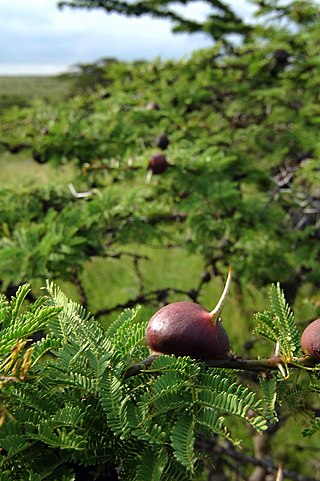
Crematogaster is an ecologically diverse genus of ants found worldwide, which are characterised by a distinctive heart-shaped gaster (abdomen), which gives them one of their common names, the Saint Valentine ant. Members of this genus are also known as cocktail ants because of their habit of raising their abdomens when alarmed. Most species are arboreal (tree-dwelling). These ants are sometimes known as acrobat ants.

Vachellia drepanolobium, more commonly known as Acacia drepanolobium or whistling thorn, is a swollen-thorn acacia native to East Africa. The whistling thorn grows up to 6 meters tall. It produces a pair of straight spines at each node, some of which have large bulbous bases. These swollen spines are naturally hollow and occupied by any one of several symbiotic ant species. The common name of the plant is derived from the observation that when wind blows over bulbous spines in which ants have made entry and exit holes, they produce a whistling noise.

Crematogaster ashmeadi, commonly known as the acrobat ant, is an arboreal ant widespread in the Southeastern United States. It nests and forages almost exclusively above ground level, often found in treetops and on lianas. It is one of eleven species in the genus Crematogaster that is native to eastern North America. This ant species has been observed to raid wasp nests, including the species Mischocyttarus mexicanus, and to forage on their brood. It is the most dominant arboreal ant in the pine forests of the coastal plains of northern Florida. Colonies of these ants inhabit a majority of pine trees in the area, living in chambers in the outer bark of living trees that have been abandoned by bark-mining caterpillars, usually of the family Cossidae. C. ashmeadi does little to no excavation of its own, relying solely on chambers bored out by other insects.

Anthene amarah, the black-striped hairtail, leaden hairtail or leaden ciliate blue, is a butterfly of the family Lycaenidae. It is found in tropical Africa and Arabia. The habitat consists of savanna and occasionally open areas in the forest zone.
Crematogaster elegans is a species of ant in the genus Crematogaster.

Crematogaster peringueyi is a southern African arboreal species of ant. They are commonly known as the black cocktail ant or swartwipgatmier (Afrikaans) for their colour and habit of arching their abdomens when alarmed.
Crematogaster buchneri is a species of ant in tribe Crematogastrini. It was described by Forel in 1894.

Crematogaster carinata is a species of ant in the tribe Crematogastrini. It was first described by Gustav Mayr in 1862. It is native to Central and South America, where it is a common species, forming large colonies in the canopy of the forest.
Crematogaster chungi is a species of ant in tribe Crematogastrini. It was described by William Louis Brown Jr. in 1949.

Crematogaster lineolata is a species of ant in the family Formicidae.

Crematogaster torosa is a species of ant in the family Formicidae.

Crematogaster laeviuscula, known generally as the acrobat ant or valentine ant, is a species of ant in the family Formicidae.

Hypoponera punctatissima, or Roger's ant, is a species of ant in the family Formicidae.

Pheidole xerophila is a species of ant and a higher myrmicine in the family Formicidae.

Crematogaster hespera is a species of ant in the family Formicidae.

Crematogaster mutans is a species of ant in the family Formicidae.

Crematogaster marioni is a species of ant in the family Formicidae.
Crematogaster punctulata is a species of ant in the family Formicidae.
Tetraponera penzigi, is a species of ant of the subfamily Pseudomyrmecinae, which can be found in East Africa. It forms an obligate symbiosis with the whistling thorn acacia, a dominant tree in some upland areas of East Africa.















